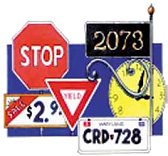This section was written with several goals in mind. It is to help parents of very young children (ages two to five) use home activities to challenge their children's minds. First, you need to see that mathematics is
everywhere. You use math every day when you shop for groceries, cook dinner, share a pizza, ride a bus, or watch a basketball game. Even if you don't think you are very good at mathematics, you are already using it successfully!
A second goal is to help you and your children
enjoy mathematics. Maybe you didn't think mathematics was fun when you were in school, but when children play with mathematics in their everyday lives they can grow up loving it. Children learn by doing -- by moving, touching, tasting, feeling, and seeing. They learn by asking questions. You can use your children's natural curiosity about the world to help them learn.

A third goal is to help you ask questions and get your children
thinking. It is not just the activities that children do that help them learn, but the questions you and your children both ask and the things you point out that get them thinking mathematically. We have tried to explain some of the reasons for activities so that you can better answer your children's questions and ask them your own questions.
There is growing evidence from research that preschool children can solve simple problems and love to do so. Children learn best when they find answers for themselves and in their own way. You don't need to spend a lot of money on flash cards or workbooks. Children learn when the problems arise out of their everyday lives. Don't be afraid to ask your children to figure out the answers to simple problems during the day. Give them time to think about the answer, but don't push them. Don't worry if they can't figure it out or don't solve it the way you think they should. Your children are thinking! You are encouraging your children's thinking and imagination. However, don't let them get frustrated. Help them by thinking out loud as you solve the problem with them.
As you read through the activities, you may discover that you are already doing some of them. Keep doing them. Try some new ones. Create your own. When you complete an activity, be sure to ask your children what they learned. Think about what you just experienced. The more your children encounter mathematics, the more comfortable they will be with it. Plus, mathematics activities from real life help children develop language as they ask questions, develop fine motor skills as they touch and move objects, and improve social skills as they work with you or others on a problem. So play games, talk about how, what, why, and how many, and enjoy the learning process. Math is fun!
Math Activities for Ages Two to Five: